Blog (446 found)
Government Leaders Not Ready for Genuine People-centered ASEAN
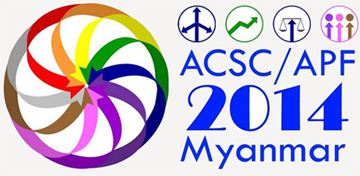 As the leaders of the governments of the Association of Southeast Asian Nations (ASEAN) gathered in Burma for the 2014 summit over the weekend, Cambodian, Malaysian and Singaporean leaders refused to meet with genuine civil society representatives. These three ASEAN member states were poised to substitute the Interface Delegates chosen by civil society groups with their own nominees, which lead the meeting between the ASEAN leaders and civil society representatives to be canceled at the last minute. The ten Interface Delegates were chosen by civil society groups to represent the voices of the 3,000 people who attended the historic ASEAN Civil Society Conference / ASEAN Peoples’ Conference 2014 (ACSC/APF 2014) held in Rangoon, Burma in March […]
As the leaders of the governments of the Association of Southeast Asian Nations (ASEAN) gathered in Burma for the 2014 summit over the weekend, Cambodian, Malaysian and Singaporean leaders refused to meet with genuine civil society representatives. These three ASEAN member states were poised to substitute the Interface Delegates chosen by civil society groups with their own nominees, which lead the meeting between the ASEAN leaders and civil society representatives to be canceled at the last minute. The ten Interface Delegates were chosen by civil society groups to represent the voices of the 3,000 people who attended the historic ASEAN Civil Society Conference / ASEAN Peoples’ Conference 2014 (ACSC/APF 2014) held in Rangoon, Burma in March […]
Will Japan Become a Model of Irresponsible Development in Burma?
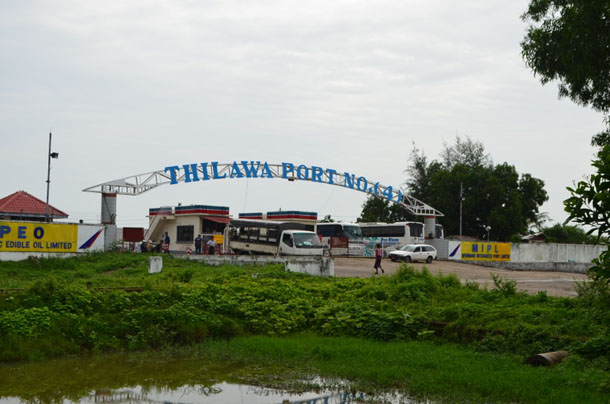 As the Thilawa Special Economic Zone Project (Thilawa SEZ) forges ahead, anger over the treatment of the local communities who are being displaced is growing. The Japan International Cooperation Agency (JICA), who just signed a deal that formalizes the financing of Thilawa SEZ is treating the communities currently living on the site area with undisguised disdain, drawing ire from local and international organizations, including on their home turf.
As the Thilawa Special Economic Zone Project (Thilawa SEZ) forges ahead, anger over the treatment of the local communities who are being displaced is growing. The Japan International Cooperation Agency (JICA), who just signed a deal that formalizes the financing of Thilawa SEZ is treating the communities currently living on the site area with undisguised disdain, drawing ire from local and international organizations, including on their home turf.
Covering around 2,400 hectares of land, the Thilawa SEZ is located 20km outside Rangoon and will include factories, a deep sea port, housing developments and other infrastructure for transport and communications. The project is a joint effort between Japan and Burma, with the Burma government and domestic businesses holding a 51% stake and the Japan government and Japanese businesses owning a 49% stake with funding being channelled through JICA as part of Japan’s overseas development assistance. Yet in order for these components to go ahead thousands of local people will be displaced. Phase One of the project, which has already started, has seen the relocation of 300 villagers yet the relocation site consists of inadequate housing, no alternative farmland, a lack of a clean water supply and very few livelihood opportunities, leaving people in debt just a few months after moving […]
• • •More Transparency Required Regarding Burma Army’s Operations
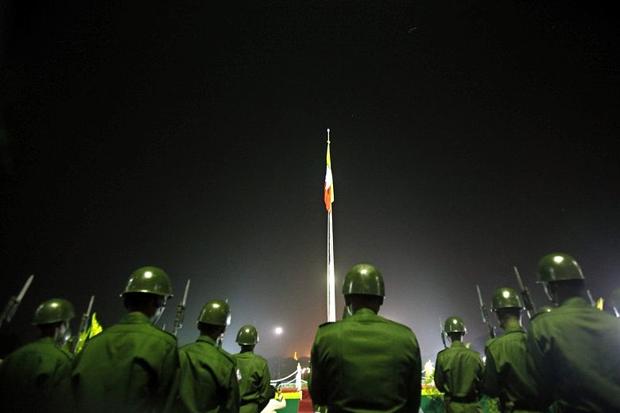 As documented on countless occasions by many local and international groups, the Burma Army has long been committing serious human rights abuses in ethnic areas of Burma, especially recently in Kachin State. Such abuses include waging war against civilians, summary executions, torture and mutilations, rape and other sexual violence against women, men and children, arbitrary detention, destruction of homes and property, and the blocking of humanitarian access. Such abuses terrorise local populations, undermine trust and confidence in the current peace process, and are illegal under international law. Furthermore, many of these human rights abuses could also be classified as war crimes or crimes against humanity […]
As documented on countless occasions by many local and international groups, the Burma Army has long been committing serious human rights abuses in ethnic areas of Burma, especially recently in Kachin State. Such abuses include waging war against civilians, summary executions, torture and mutilations, rape and other sexual violence against women, men and children, arbitrary detention, destruction of homes and property, and the blocking of humanitarian access. Such abuses terrorise local populations, undermine trust and confidence in the current peace process, and are illegal under international law. Furthermore, many of these human rights abuses could also be classified as war crimes or crimes against humanity […]
Burma Army Makes a Mockery of the Census and its Backers
———— We would like to dedicate our Weekly Highlights today to U Win Tin, Co-founder and patron of the National League for Democracy, for always standing up for the oppressed and voiceless. We are deeply saddened Ba Ba passed away this morning. Although he is no longer physically with us, his unwavering righteous mind and courage will continue to be the guiding light and the inspiration for us and for all who continue in their fight for genuine democracy and freedom of speech in Burma.
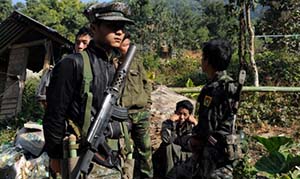 Just 48 hours after peace talks in Rangoon concluded on 8 April between the government and ethnic non-state armed groups, including the Kachin Independence Organization (KIO), the Burma Army launched another round of offensives in southern Kachin State against the Kachin Independence Army (KIA). Fighting has been on-going since, forcing thousands of Kachin, Shan, and Palaung villagers to flee, many of whom had already been displaced in this conflict.
Just 48 hours after peace talks in Rangoon concluded on 8 April between the government and ethnic non-state armed groups, including the Kachin Independence Organization (KIO), the Burma Army launched another round of offensives in southern Kachin State against the Kachin Independence Army (KIA). Fighting has been on-going since, forcing thousands of Kachin, Shan, and Palaung villagers to flee, many of whom had already been displaced in this conflict.
Burma Army soldiers originally used the nationwide census as a pretext to accompany enumerators into KIA territory and launch attacks on various KIA outposts. State media has reported 22 dead due to the resulting clashes but the true figure is probably much higher. Meanwhile, according to a statement released by a coalition of humanitarian groups working in the conflict-affected areas, over three thousand villagers have been forced to flee, many of whom had to leave an internally displaced people (IDP) camp, from which they had settled after previous attacks. Several local news sources have stated the figure of those displaced maybe as high as ten thousand people […]
• • •Poorly Planned Census in Disarray as Calls for Postponement Grow Stronger
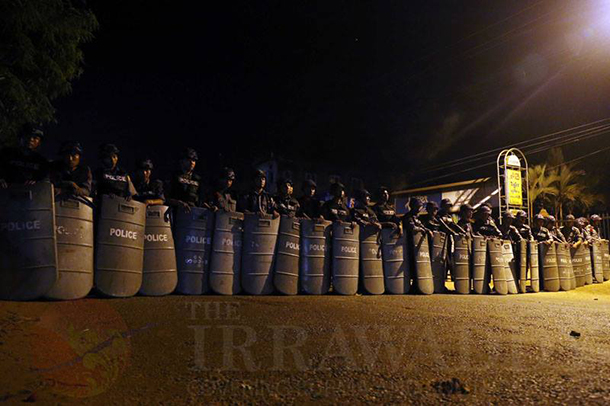 Enumerators arrived in Arakan State on Sunday, 30 March in the company of three hundred armed policemen who were brought into the area in several army trucks to conduct the nationwide survey. The first national census since 1983 should be vital in planning the nation’s needs in health, education and development. However, the census has triggered violence in Arakan State, as humanitarian aid offices were raided, aid workers fled, local aid workers threatened not to assist the Rohingya, and aid to the Rohingya communities living in internally displaced camps has halted.
Enumerators arrived in Arakan State on Sunday, 30 March in the company of three hundred armed policemen who were brought into the area in several army trucks to conduct the nationwide survey. The first national census since 1983 should be vital in planning the nation’s needs in health, education and development. However, the census has triggered violence in Arakan State, as humanitarian aid offices were raided, aid workers fled, local aid workers threatened not to assist the Rohingya, and aid to the Rohingya communities living in internally displaced camps has halted.
So far three people – two under the age of five – have died as a result of the absence of medical care and food prices are soaring as water and food becomes scarce. The Burma government has rescinded their commitment to allow Rohingya’s to self-identify, folding under pressure from Arakanese Buddhists to boycott the census. The tension in Arakan State is spreading throughout Burma as an anti-Muslim riot took place in a town on the outskirts of Rangoon, where an angry Buddhist mob pelted Muslim-owned properties with stones[…]
• • •Facilitating Hate from the Highest Levels of Power
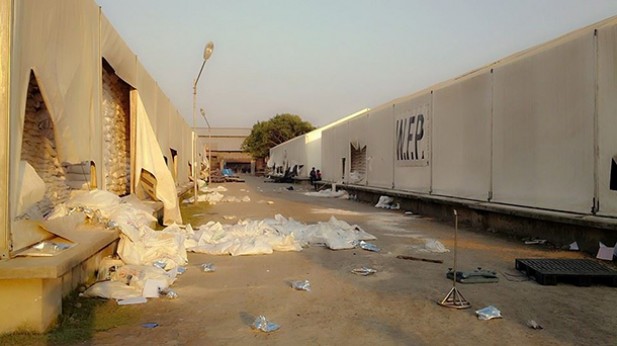 The situation in Arakan State is deteriorating rapidly as extremist monks continue to spread hate speech and incite violence against the Muslim community with impunity. With the upcoming census set to inflame tensions over the issue of Rohingya, Arakanese nationalists have been exacerbating these tensions by campaigning for the census to be changed. Such protests descended into violence as United Nations (UN) and non-governmental organizations’ (NGO) offices were ransacked and aid workers forced to flee. Meanwhile, at the national level, highly discriminatory laws are being drafted by certain ministries to be presented to Parliament.
The situation in Arakan State is deteriorating rapidly as extremist monks continue to spread hate speech and incite violence against the Muslim community with impunity. With the upcoming census set to inflame tensions over the issue of Rohingya, Arakanese nationalists have been exacerbating these tensions by campaigning for the census to be changed. Such protests descended into violence as United Nations (UN) and non-governmental organizations’ (NGO) offices were ransacked and aid workers forced to flee. Meanwhile, at the national level, highly discriminatory laws are being drafted by certain ministries to be presented to Parliament.
The leader of the extremist Buddhist 969 movement, Wirathu, has been whipping up anti-Muslim fervor among the local Arakanese Buddhist population, demanding that the UN-planned census be changed. The All Rakhine Committee for the Census (ARCC) had threatened a state-wide boycott of the census due to the option for Rohingya to identify themselves as Rohingya. Adding to the tension has been the antagonism towards international relief and UN agencies for allegedly favouring Rohingya Muslims in their work. This is, of course, a preposterous claim given that such organizations engage in service provision for those who need it most, regardless of their ethnicity, religion or political affiliation, with the majority of such victims happening to be Rohingya. This fervor came to a head as mobs descended on UN and NGO offices in the state capital, Sittwe, late last week […]
• • •People of ASEAN Stand Up To Be Counted
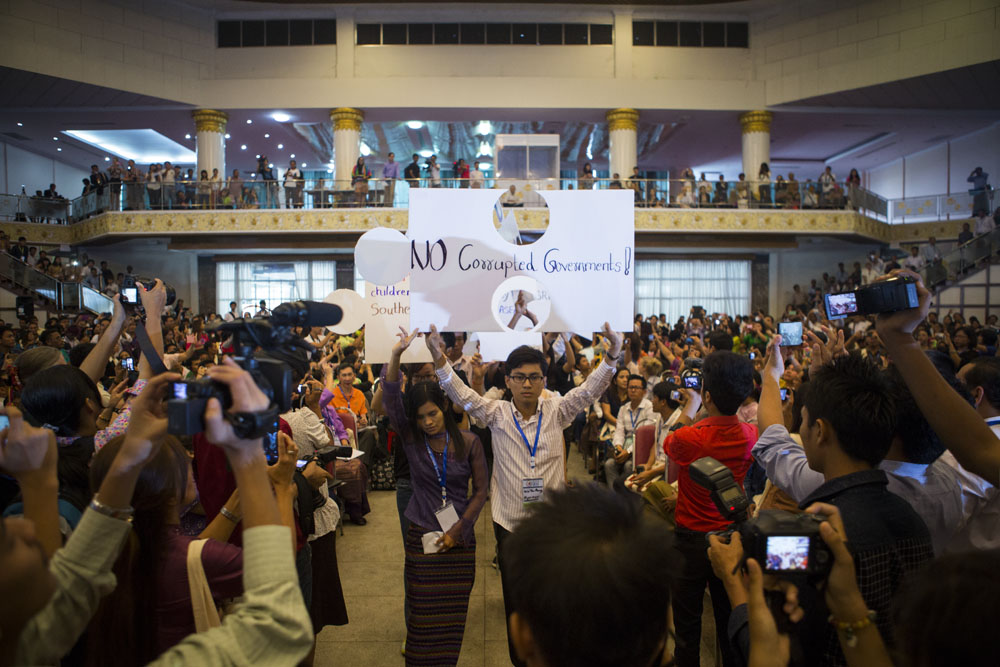 The ASEAN Civil Society Conference/ASEAN People’s Forum (ACSC/APF) 2014, held in Rangoon, Burma, on 21-23 March, and co-organised by long-standing Burma advocates to ASEAN, namely Burma Partnership, Task Force on ASEAN and Burma, and Women’s League of Burma, together with 80 other civil society organizations (CSOs) and community based organizations (CBOs), can be hailed as a great success as well as a historic event. Not only was it the first ACSC/APF to be held in Burma, it was also the highest attended ACSC/APF since the ACSC/APF first took place in 2005, with over 3,000 participants. It was a great opportunity for people of all ethnic nationalities from across Burma – CSOs, CBOs, rights activists networks, and grassroots activists – to meet people from their own countries and from others around the ASEAN region as well as from Timor leste and beyond, to share their concerns, and above all, to demonstrate the strength and solidarity of civil society in Burma and in ASEAN[…]
The ASEAN Civil Society Conference/ASEAN People’s Forum (ACSC/APF) 2014, held in Rangoon, Burma, on 21-23 March, and co-organised by long-standing Burma advocates to ASEAN, namely Burma Partnership, Task Force on ASEAN and Burma, and Women’s League of Burma, together with 80 other civil society organizations (CSOs) and community based organizations (CBOs), can be hailed as a great success as well as a historic event. Not only was it the first ACSC/APF to be held in Burma, it was also the highest attended ACSC/APF since the ACSC/APF first took place in 2005, with over 3,000 participants. It was a great opportunity for people of all ethnic nationalities from across Burma – CSOs, CBOs, rights activists networks, and grassroots activists – to meet people from their own countries and from others around the ASEAN region as well as from Timor leste and beyond, to share their concerns, and above all, to demonstrate the strength and solidarity of civil society in Burma and in ASEAN[…]
ACSC/APF 2014 is Burma’s Chance to Set a Positive Benchmark for ASEAN Civl Society
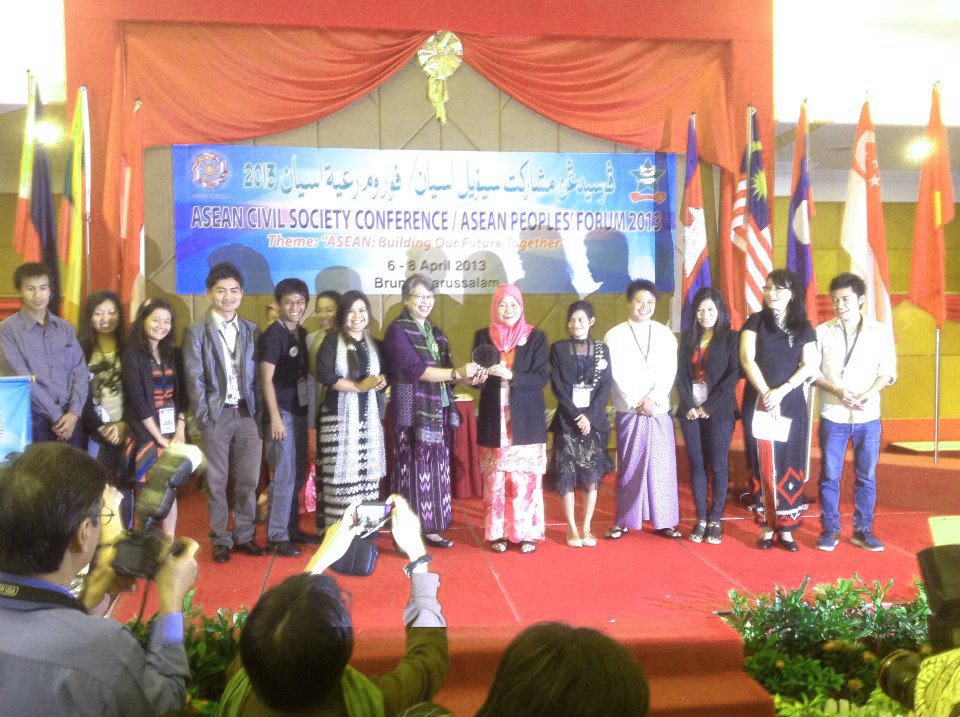 On 21-23 March, the 2014 ASEAN Civil Society Conference (ACSC), otherwise known as the ASEAN People’s Forum (APF), will take place in Rangoon, Burma. The ACSC/APF is held annually by the ASEAN Chair country – currently Burma – in advance of and parallel to the official ASEAN Summit, which will be held in May and attended by ASEAN and regional leaders.
On 21-23 March, the 2014 ASEAN Civil Society Conference (ACSC), otherwise known as the ASEAN People’s Forum (APF), will take place in Rangoon, Burma. The ACSC/APF is held annually by the ASEAN Chair country – currently Burma – in advance of and parallel to the official ASEAN Summit, which will be held in May and attended by ASEAN and regional leaders.
The ACSC/APF is the showcase event for the ASEAN civil society community. Civil society actors from across the ten ASEAN countries, as well as Timor Leste, and beyond will be coming to Rangoon to attend a range of programs, events and workshops on a variety of ASEAN issues. Their mandate is to represent the voices of the people of ASEAN. The theme of this year’s ACSC/APF is “Advancing ASEAN People’s Solidarity toward sustainable peace, development, justice and democratization”.
• •The Burma Army and Its Language of Aggression
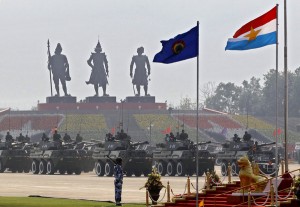 Mixed messages on the peace process came out this week as the government proposed for the first time to commit a substantial amount of money into the peace process. Yet the Commander-in-Chief of the Armed Forces Senior General Min Aung Hlaing’s inflammatory comments on the indestructibility of the Burma Army and blaming the conflict on the country’s ethnic armed groups expose the attitudes of the country’s most powerful institution. Meanwhile, a second round of formal talks between ethnic armed groups and the government’s Union Peace Working Committee on the nationwide ceasefire accord have been postponed until February as ethnic representatives further discuss the accord.
Mixed messages on the peace process came out this week as the government proposed for the first time to commit a substantial amount of money into the peace process. Yet the Commander-in-Chief of the Armed Forces Senior General Min Aung Hlaing’s inflammatory comments on the indestructibility of the Burma Army and blaming the conflict on the country’s ethnic armed groups expose the attitudes of the country’s most powerful institution. Meanwhile, a second round of formal talks between ethnic armed groups and the government’s Union Peace Working Committee on the nationwide ceasefire accord have been postponed until February as ethnic representatives further discuss the accord.
A local newspaper, True News, published comments made by Senior General Min Aung Hlaing at a briefing to officers in Naypyidaw in November 2013. The language of peace and reconciliation was conspicuously absent in his address, “We made peace agreements, but that doesn’t mean we are afraid to fight. We are afraid of no one. There is no insurgent group we cannot fight or dare not to fight.” The Burma Army chief also states that he intends to follow the path laid down by Senior General Than Shwe, the former head of the military junta that suffocated and terrorized Burma from 1988 to 2011. Burma’s underdevelopment, he adds, is “because of internal insurgents who caused conflict in the country.” […]
Despite End-of-Year Amnesty, Political Prisoner Issue Casts Shadow Over 2014
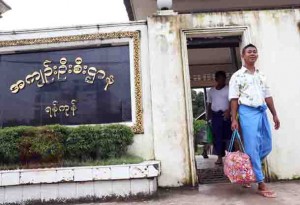 To casual Burma observers, President Thein Sein may appear to have fulfilled his promise to British Prime Minister David Cameron on 15 July 2013 that all political prisoners in Burma would be released by the end of 2013. After all, political prisoners were freed throughout 2013, culminating in two “final” releases on 11 December (41 released) and 31 December (16 released). The motive is not hard to discern: such high profile releases play into the current “good news” narrative on Burma. The international community, hungrily eyeing up Burma’s huge potential as an untapped frontier market of boundless investment opportunities, cheap labor and vast natural resources, tends to lap up such reports without examining the narrative more carefully.
To casual Burma observers, President Thein Sein may appear to have fulfilled his promise to British Prime Minister David Cameron on 15 July 2013 that all political prisoners in Burma would be released by the end of 2013. After all, political prisoners were freed throughout 2013, culminating in two “final” releases on 11 December (41 released) and 31 December (16 released). The motive is not hard to discern: such high profile releases play into the current “good news” narrative on Burma. The international community, hungrily eyeing up Burma’s huge potential as an untapped frontier market of boundless investment opportunities, cheap labor and vast natural resources, tends to lap up such reports without examining the narrative more carefully.
Inevitably the narrative is not so simple. The most prominent criticism of the Burma government’s policy towards political prisoners in 2013 was that it was releasing some, while all the time arresting others, particularly land and community activists. This “revolving door” policy ensured that Burma’s jails were in no danger of being put out of business […]









 All posts
All posts